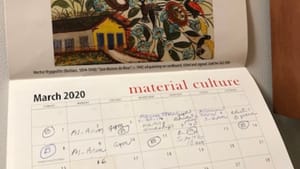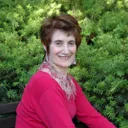Stay in the Loop
BSR publishes on a weekly schedule, with an email newsletter every Wednesday and Thursday morning. There’s no paywall, and subscribing is always free.
Eight months on the coronacoaster
Here's how one person over 60 is handling life in quarantine, eight months later

My 2020 calendar says it all.
January through March 15: gym five times a week; 12-Step meetings; meals with friends; outings to the Barnes and the Art Museum; theater and dance performances at the Kimmel and the Merriam; writing-group sessions at Shakespeare and Co.; dentist and internist appointments; volunteering at the Philadelphia Flower Show. After moving from New York City to Philadelphia in June 2019, I had finally found my groove and my way around my new city. I felt settled with a routine and easy rhythm to my days. Life was busy, full of purpose, promise, and human connection.
From March 16 on? Mostly blank pages with deleted activities; a few essential medical appointments; and a haircut.
Days drag and months fly
Like a lot of other people around the globe, my life has been upended by coronavirus, which forced me into prolonged isolation, alone in my apartment, bereft of in-person human contact. In an at-risk group of people over 60, I venture outside “my cave” only to Trader Joe’s, CVS, Chase Bank, or to a bench in Rittenhouse Square. I still am fearful about eating out, though both outdoor and indoor restaurant dining are now permitted in Philadelphia.
Given my new sedentary lifestyle, I question whether I need a calendar, but then again, I constantly consult it to recall the day of the week and, I must admit, even the month. My sense of time has become warped and unreliable—days blur together with no distinction between weekend and weekday. In coronatime, days drag but weeks and months fly by.
Early hopes
During the first few weeks of lockdown, I actually thrived. I felt cozy and safe inside my apartment. I wrote daily. My “to-do” lists quickly became “done” lists. Feeling energized and proactive, I never procrastinated or hung out in bed. I phoned friends and we compared notes about quarantining and laughed at our overzealous responses to the virus, like donning a double mask and disinfecting the mail. I, an insomniac, even experienced hours of uninterrupted sleep.
I felt hopeful the crisis would be short-lived. Most folks followed the protocols to mitigate the spread of COVID-19—staying home, wearing masks, using hand sanitizer, social distancing. Furthermore, we lived in the United States of America, the most affluent, medically advanced nation in the world. Right? No way would we become like Italy, with soaring infection rates and deaths throwing the healthcare system into crisis.

Call me Pollyanna. As days of isolation morphed into weeks and weeks into months, coronafatigue and declining compliance set in and further divided America. Even “no-brainer” mask-wearing and social distancing became politicized. Our country, with its skyrocketing infections and fatalities, and top leaders and pundits who decried COVID-19 as “a hoax,” has left us floundering in ways worse than Italy and other countries. At the pandemic’s onset, projections of 100,000 deaths seemed alarmist. Then, in September, we surpassed 200,000.
Nightmares and worry
COVID reality is hitting me unexpectedly hard as I struggle to fight off anger, fear, frustration, sadness, grief, and a debilitating depression that won’t go away. I may not be clinically depressed, or suicidal, or in need of medication, but I live with a nagging despair. I am just not the person I was pre-pandemic. I never felt so lonely and isolated.
These coronablues have profoundly affected my writing. I find it almost impossible to focus…on anything. This essay is my first writing attempt in weeks, and it is excruciatingly slow-going.
My improved sleep patterns are gone. I immediately fall asleep but jolt awake two hours later from COVID dreams. In one dream, I was forced to drink COVID-infected liquid; in another, I heard the words, “I hate the Kaddish,” a reference to the Jewish prayer for the dead and, by extension, to the deadliness of the virus.
My naturally upbeat friends also feel what my friend Eleanor calls “the depression of the world.” My friends and I barely talk anymore; when we do, our conversations are mired in COVID-19 and the government’s abysmal response to it.
With very little personal contact, sleepless nights, and lack of fulfilling activities (especially writing), I face too much time for self-reflection. The unpleasant present is painful, so I conjure up the past, which, for me, only conjures up mistakes and missed opportunities. Thinking about the pandemic’s indefinite trajectory stresses me. If there is a vaccine, perhaps our best defense against this killer virus, will enough people take it to confer herd immunity? Coping with such uncertainty is not in my wheelhouse.

The only way out of limbo
Despite my negativity, I am determined to fight whatever is ailing me. I am tired of feeling like a victim without any power to lift myself out of this dark hole.
Having been therapized and 12-Stepped for years, I’ve learned I need not be defined by my negative feelings. I can—and should—acknowledge their existence, but I don’t have to wallow in them. In fact, I believe that feeling an individual and collective coronafunk is perfectly normal.
I also have tools to help me cope: monitoring my mind to counter my negative thoughts with positive ones; having faith that “this too shall pass,” which is how I signed my e-mails early in the pandemic when I felt hopeful; practicing self-care by hydrating, eating well, and permitting myself to binge-watch Netflix without guilt.
To keep busy, I’ve signed up for online exercise classes. I take longer walks and hang out in my building’s communal garden. Even if I’m not in the mood, I reach out to friends and family.
Most of all, I try to accept the circumstances that 2020 has dealt us. For me, a control freak bent on immediate solutions, practicing acceptance is challenging. However, I know from experience that non-acceptance can keep me in limbo, while acceptance will empower me and heal my state of mind.
I am making friends with my solitude again, grateful it’s keeping me alive and COVID-free.
Image description: A photo of a wall calendar for the month of March 2020. It’s full of handwritten entries for the first half of the month, and the latter half is empty.
Image description: A photo of a wall calendar for the month of January 2020. It’s packed with handwritten entries.
Image description: A photo of a wall calendar for the month of June 2020. It has almost no event entries.
Sign up for our newsletter
All of the week's new articles, all in one place. Sign up for the free weekly BSR newsletters, and don't miss a conversation.

 Fredricka R. Maister
Fredricka R. Maister